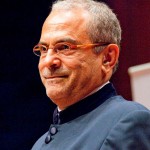“More courage is required to forgive than is required to take up arms.”
José Ramos-Horta is a political activist who fought for East Timor’s independence for twenty-four years in exile. During his time in exile, Ramos-Horta was honored with the Nobel Peace Prize, along with Carlos Filipe Ximenes Belo, “for their work towards a just and peaceful solution to the conflict in East Timor.”1 He continued to speak around the world on behalf of East Timor until its independence in 1999. He then returned to East Timor and served in multiple leadership positions as he continued to work towards a peaceful East Timor.
At the age of eighteen, Ramos-Horta began his journey into politics as he got involved in various independence-seeking groups. Ramos-Horta said that he began to be pro-independence while working at a Portuguese television station.2 At the age of twenty, he worked briefly at a tourist information department. While having some drinks with two men, he made some “outrageous remarks” and was interrogated by the Portuguese security police over the next few days.3 He was exiled to Mozambique for two years.
After returning home, he continued to be involved in the politics of East Timor. In November 1975, while only twenty-five, Ramos-Horta was made foreign minister in the new and independent East Timor government. He left on December 4 for Australia, Europe, and the US. Just three days later, East Timor was invaded by Indonesia. Unable to return home, Ramos-Horta then began his twenty-four year campaign speaking on behalf of East Timor.
His first experience in representing East Timor happened only two days after the invasion. As Ramos-Horta spoke on behalf of East Timor in 1975, he became the youngest person to address the United Nations in this capacity. After his address, a resolution was passed by the UN to support East Timor’s independence. Despite the resolution, East Timor did not gain independence for another twenty-four years. Ramos-Horta never gave up and continued to work for East Timor’s peace throughout its struggle for independence.
East Timor finally gained its independence in 1999, but Ramos-Horta’s work was far from over. He became Prime Minister of East Timor in 2006 and then was elected President in 2007. During this time, forgiveness and reconciliation were an important message of Ramos-Horta’s work. In 2009, as President of East Timor, he gave a speech asking the Timorese people to forgive the Indonesians who committed crimes against them during their vote for independence in 1999.4 In an interview he said,
“More courage is required to forgive than is required to take up arms.”5
Ramos-Horta not only asked his people to forgive, but set an example of forgiveness. Ramos-Horta lost a sister and two brothers during the conflict in East Timor, but he still sought for forgiveness. He said, “Just remember that violence leads you nowhere. We have to learn not to be violent if we want to have power. Compassion, generosity, humility, tolerance are real power.”6
He was also given the opportunity to forgive those who sought to take his life. After being shot during an assassination attempt, Ramos-Horta was able to forgive those who attacked him. “In a ceremonial surrender, the twelve men handed over their weapons at the government offices in Dili, where President Ramos-Horta shook their hands and offered his personal forgiveness.”7
Ramos-Horta has continued to work for peace around the world. In 1989, he founded the Diplomacy Training Program, an NGO that uses education and training to help NGOs and individuals build skills to better defend human rights in the Asia Pacific region.8 He is currently serving as the Special Representative and Head of the United Nations Integrated Peacebuilding Office in Guinea-Bissau.
- Nobelprize.org. 1996. “Press Release – Nobel Peace Prize 1996”. Accessed October 15, 2013. http://www.nobelprize.org/nobel_prizes/peace/laureates/1996/press.html
- Washington Post. “Comera Works: Speak Truth to Power.” http://www.washingtonpost.com/wp-srv/photo/onassignment/truth/13.htm
- Washington Post. “Comera Works: Speak Truth to Power.” http://www.washingtonpost.com/wp-srv/photo/onassignment/truth/13.htm
- Murdoch, Lindsay. 2009. “Forgive Indonesian crimes, Ramos-Horta urges East Timorese.” Sydney Morning Herald, August 31, 2009. http://www.smh.com.au/world/forgive-indonesian-crimes-ramoshorta-urges-east-timorese-20090830-f402.html
- Kennedy, Kerry. “Speak Truth To Power: José Ramos-Horta.” Accessed October 24, 2013. http://rfkcenter.org/jose-ramos-horta
- PeaceJam. “José Ramos-Horta: 1996 Nobel Peace Prize.” http://www.peacejam.org/laureates/Jos%C3%A9-Ramos-Horta-8.aspx
- Kingsburry, Damien. 2009. “East Timor in 2008 Year of Reconstruction.” Southeast Asian Affairs: 359.
- Diplomacy Training Program. “The Diplomacy Training Program- Making a Difference for Human Rights.” http://www.dtp.unsw.edu.au/who-we-are



José Ramos-Horta’s is a man of high integrity and respect. He had the courage to stand up for what was right, and addressed the United Nations Security Council asking them to demand Indonesia withdraw its forces from Timor-Leste. As the youngest diplomat in the history of the UN, he has inspired people like myself to find it possible to work in the field of diplomacy.
Mr. Horta’s stance for peace reminds us all that no matter what the situation, peace can be achieved.
Mr. Ramos-Horta ‘s ability to forgive those that have hurt or offended him has only facilitated his great accomplishment of being a political activist that fought from exile for so many years. His belief that power in government is obtained through forgiveness and love and not through violence is moving and constitutes indispensable advice for citizens of our closely interconnected world. Addressing the United Nations in the capacity as the youngest ever Foreign Minister on the conflict in East Timor ,highlights his tremendous passion for fostering peace.This mandate was further continued when he served as Prime Minister and then later President of East Timor inspiring its citizens to forgive previous atrocities rather than use force, if the healing process was to be made possible. Peace is crucial especially in contemporary times where the rise of intrastate wars is prevalent. As such,more persons like Mr. Ramos-Horta with expertise in peacemaking and peacekeeping while defending human rights is paramount if unity. love and brotherhood are to ever be attainable.